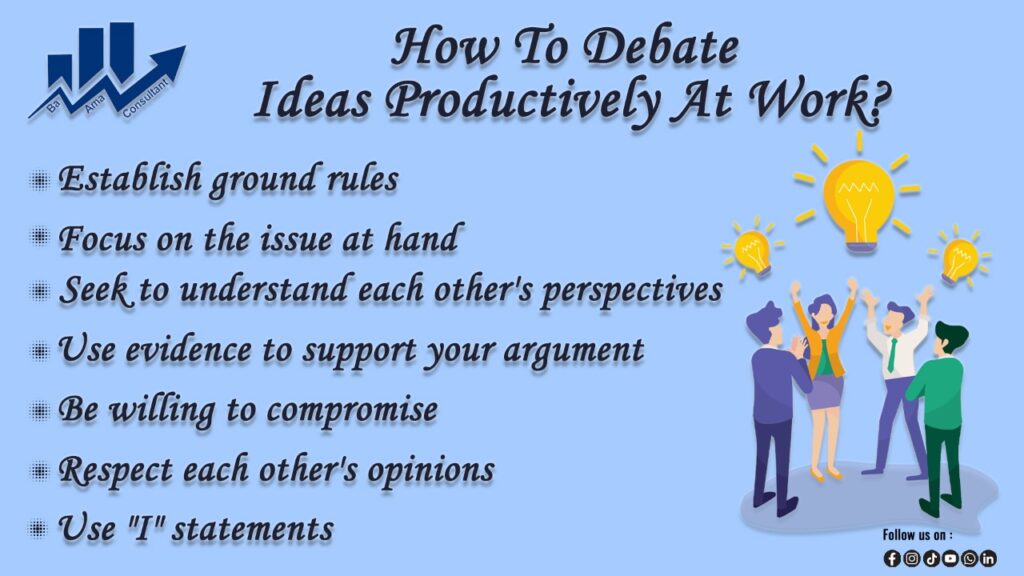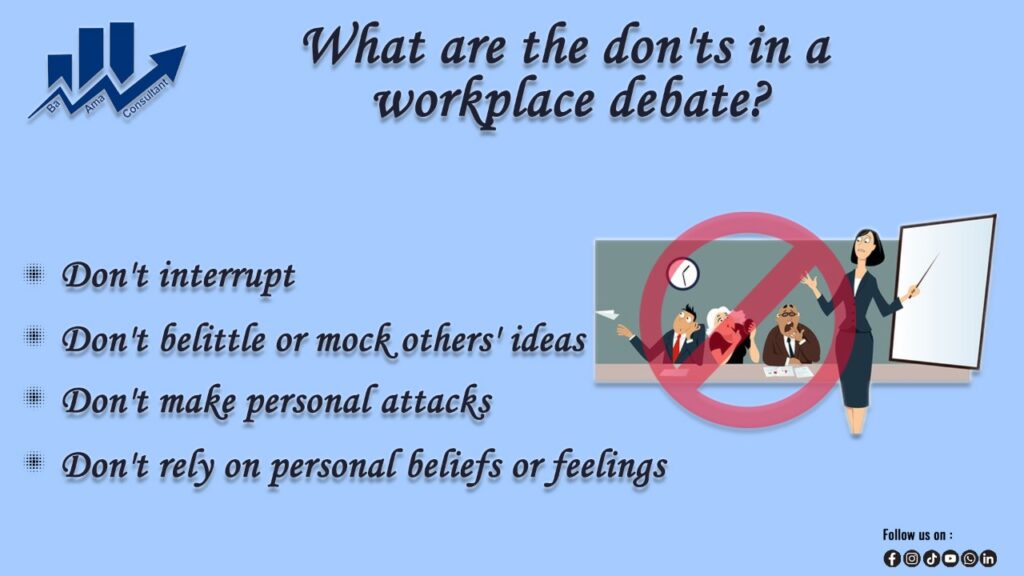When we argue and debate, we are reminded that we are not alone, that we are part of a team and that together, we can find a solution.”
– Simon Sinek
Debate Ideas Productively at Work is an important part of the work environment as it allows for the exchange of different perspectives and the exploration of new solutions. However, it can also be a source of conflict and tension if not done in a respectful and productive manner.
In this post, we will provide tips and strategies for how to engage in healthy debates at work that result in the best outcomes for everyone involved. We will also discuss how to handle conflicts that may arise during the debate process and how to come to a resolution that is fair and beneficial for all parties.
We hope that by the end of this post, you will have a better understanding of how to debate ideas productively at work and be able to apply these skills in your own professional setting.
What makes for a healthy workplace debate?
The best ideas win, not the loudest.”
– Rick Pitino
A healthy workplace debate is one in which all participants feel heard and respected, and where a resolution is reached that is fair and beneficial for all parties. Here are some characteristics of a healthy workplace debate:

1. Clear communication:
Participants should be able to clearly and respectfully express their viewpoints and actively listen to the perspectives of others.
2. Respect for others:
All participants should respect the opinions and viewpoints of others, even if they do not agree with them. Personal attacks and belittling of others’ ideas should be avoided.
3. Open-mindedness:
Participants should approach the debate with an open mind and be willing to consider other perspectives.
4. Evidence-based arguments:
Participants should support their arguments with evidence and data, rather than relying on personal beliefs or feelings.
5. Willingness to compromise:
A healthy debate does not always have to result in one person winning and the other losing. It is important for participants to be willing to find a solution that works for everyone.
By following these principles, a workplace debate can be a healthy and productive way to exchange ideas and explore new solutions.
How To Debate Ideas Productively At Work?
You need to know how to present your ideas so that they can be heard and marked as productive. If you debate any idea which is not so productive then it will be a waste of time for everyone present in the meeting.

Here are seven things that you can do to debate ideas productively at work.
1. Establish ground rules:
Before beginning a debate, it is important to establish ground rules to ensure that the discussion stays respectful and productive. This can include setting a time limit for the debate, agreeing to listen to each other’s viewpoints without interrupting, and avoiding personal attacks.
2. Focus on the issue at hand:
It is easy to get sidetracked or bring up unrelated issues during a debate. A topic should be kept in mind at all times, and irrelevant arguments should be avoided.
3. Seek to understand each other’s perspectives:
It is important to approach the debate with an open mind and a willingness to understand the other person’s perspective. This means actively listening to their viewpoints and asking clarifying questions to make sure you fully understand their position.
4. Use evidence to support your argument:
In order to have a productive debate, it is important to back up your arguments with evidence. This can include data, research, or examples that support your position.
5. Be willing to compromise:
A debate does not always have to result in one person winning and the other losing. It is important to be willing to compromise and find a solution that works for everyone.
6. Respect each other’s opinions:
Even if you do not agree with the other person’s perspective, it is important to respect their right to hold that opinion. Avoid belittling or mocking their ideas and instead focus on respectfully expressing your own viewpoint.
7. Use “I” statements:
Instead of blaming or accusing the other person, try using “I” statements to express how their actions or words have affected you. For example, “I feel frustrated when we have these discussions because it seems like we are not really listening to each other” is more effective than “You never listen to my ideas.”
By following these tips, you can engage in productive debates at work that results in better outcomes for everyone involved.
What are the don’ts in a workplace debate?
Here are some don’ts for engaging in a healthy workplace debate:

Do not interrupt: Allow the other person to fully express their views without interrupting them.
Don’t belittle or mock others’ ideas: Respectfully express your own viewpoint without attacking or belittling the other person.
Do not make personal attacks: Avoid making personal attacks or insults, and focus on the issue being debated rather than attacking the person.
Don’t rely on personal beliefs or feelings: Support your arguments with evidence and data, rather than relying on personal beliefs or feelings.
By following this don’ts, you can engage in a healthy and productive workplace debate.
Conclusion
In conclusion, debating ideas is an essential part of the work environment as it allows for the exchange of different perspectives and the exploration of new solutions. However, it is important to approach debates in a respectful and productive manner in order to avoid conflicts and achieve the best outcomes for all parties involved.
By following the tips and strategies outlined in this post, you can engage in healthy and productive workplace debates that lead to better solutions and a more harmonious work environment. These skills can be particularly useful in situations where there is disagreement or conflicting viewpoints, as they allow for a respectful and evidence-based exchange of ideas that ultimately leads to a fair and mutually beneficial resolution.

